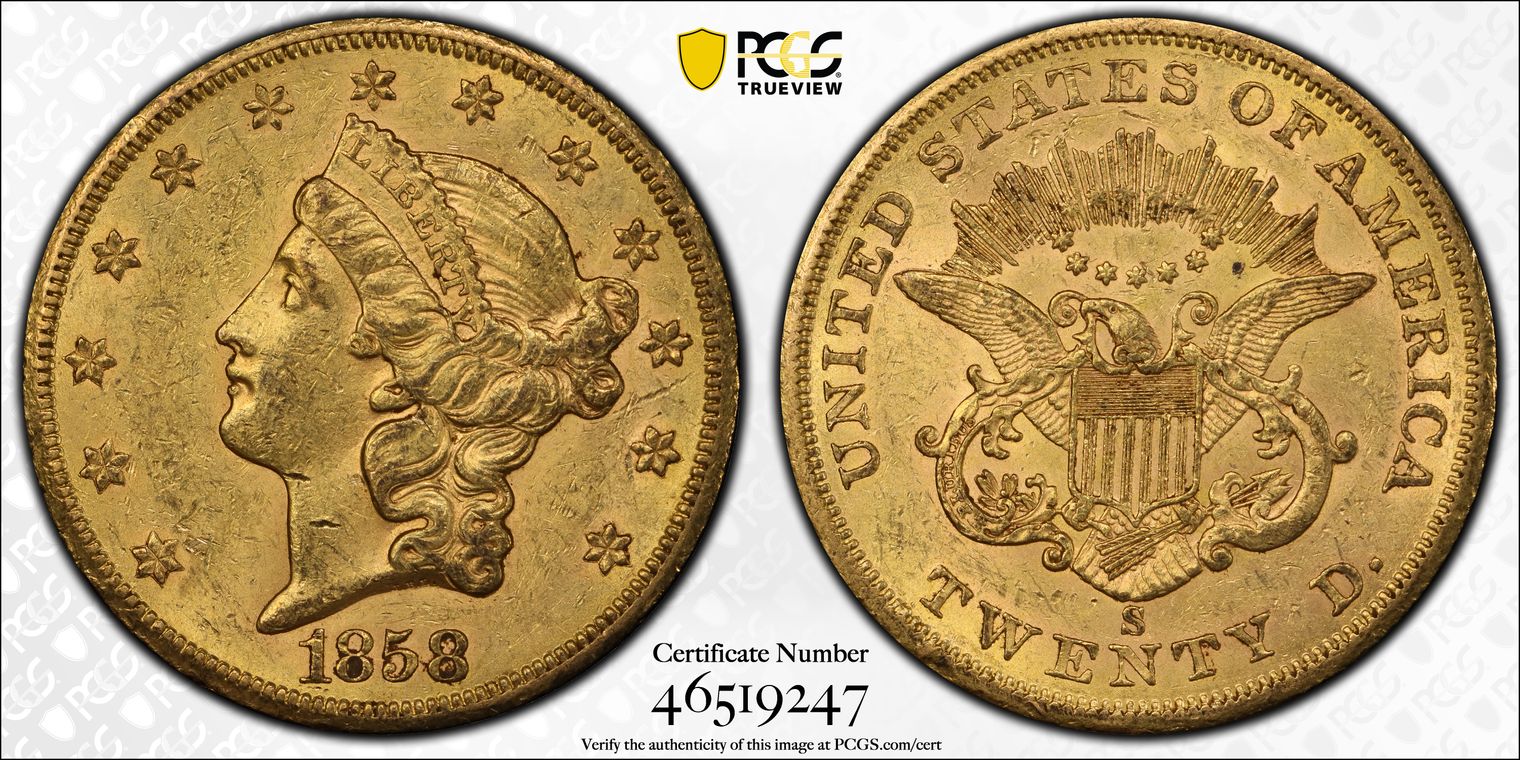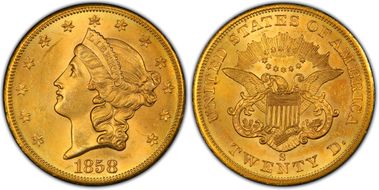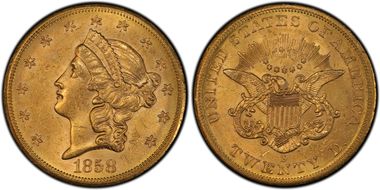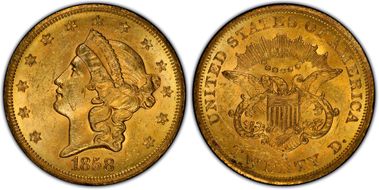1858-S $20 MS61 认证号46519247, PCGS号8925
专家评论
Doug Winter
The following information is from my eBook on Type One Liberty Head Double Eagles at http://doubleeaglebook.com/Because of the fact that most of the other San Francisco double eagles of this era have had their populations swelled by hoards, the 1858-S has become a forgotten issue. Collectors assume that it is common but, as of 2014, it remains a very rare issue in higher grades.
STRIKE: The 1858-S shows an above-average quality strike in comparison to other San Francisco double eagles of this era. The hair detail on the obverse is reasonably sharp with the curls around the face and below the ear showing more definition than usual. The hair at the top of the head and Liberty’s bun may show some weakness. On the reverse, the tail feathers are usually weak while the rest of the centers are sharp. On some, there is a moderate amount of weakness on the denticles, especially below TWENTY D.
SURFACES: The surfaces on the typical 1858-S double eagle are actually cleaner than those seen on the 1859-S and the 1860-S. However, it is still not easy to find an example which has very clean fields. A few 1858-S double eagles are seen with mint-made chips or roughness in the planchet while others may have small mint-made copper spots.
LUSTER: The luster is frosty in texture with a pronounced granularity. Some are more satiny in appearance and these are regarded as being more desirable by specialists in the series. high-grade pieces may show decent luster but, of course, these coins are not going to have the breathtaking appearance as seen on high-grade 1856-S and 1857-S double eagles from the S.S. Central America.
COLORATION: The natural coloration is an attractive rich rose-gold or orange-gold hue. There are still a decent number of 1858-S double eagles with natural color that the patient collector should be able to acquire one without a great effort.
EYE APPEAL: The 1858-S double eagle has slightly below average to average quality eye appeal. Most are well struck and higher grade pieces tend to show fewer marks in the fields than on other dates of this era. CAC quality pieces sell for a small premium over typical coins but in my experience, nice About Uncirculated 1858-S double eagles are becoming harder to find every year.
INTERESTING VARIETIES: All 1858-S double eagles have a Medium mintmark as on the 1859-S. There are a number of minor positional varieties known.
PROOFS: There were no proofs this year.
HOARDS: A total of 60 were recovered from the S.S. Republic, including six in Uncirculated. There were seven low grade pieces in the S.S. Brother Jonathan treasure. A small number of Uncirculated pieces were said to have found in a Northern California estate that was sold in the early 1970’s. Small numbers of 1858-S double eagles are still found in Europe but these tend to be in low grades.
BUYING TIPS: It seems unlikely that any shipwrecks will swell the population of this date. None, of course were included in the S.S. Central America as that wreck sank in 1857 and the numbers from the S.S. Republic and the S.S. Brother Jonathan were not substantial.
AUCTION RECORD: The current auction record is $37,375 which was set by an NGC MS63 offered as Heritage 2012 FUN: 5035.
FINEST KNOWN: The finest known is a single PCGS MS63 from the Crawford collection. The second finest is the NGC MS63 described above.
RARITY:
TOTAL KNOWN: 1000-1250+
BY GRADE:
Very Fine: 250-350
Extremely Fine: 475-565
About Uncirculated: 250-300
Uncirculated: 25-35
POPULATION FIGURES: As of the beginning of 2015, PCGS had graded one in MS60, 12 in MS61, and one in MS63 for a total of 14 coins in Uncirculated. NGC had graded three in MS60, 20 in MS61 and one in MS63 for a total of 24 in Uncirculated. This includes six Uncirculated coins from the S.S. Republic. It is likely that the figures for MS61 coins are inflated by resubmissions. CAC has only approved two Uncirculated examples, both graded MS61.
PERFORMANCE SINCE 2002: In the current market, a choice About Uncirculated example of this date (equivalent to an AU55) is worth $3,250-3,750. The same coin in 2002 was worth $1,500-1,750. An average quality Uncirculated example of this date (equivalent to an MS61) is currently worth $12,500 to $15,000. The same coin in 2002 was worth $7,000-9,000. The price performance of this date lags some of the other comparable Type One double eagles from this mint. As I’ve said elsewhere, the 1858-S is an undervalued date.
COMMENTS: Even though six Uncirculated coins were found in the S.S. Republic, including an NGC MS63 which is clearly among the two finest known for the date, the 1858-S is an issue which has remained much harder to find in higher grades than other Type One San Francisco double eagles from this era. Issues like this suffer what I call “association fate” in that they are immediately thought to be more common than they are due to their association with common issues such as the 1856-S and the 1857-S.
David Akers (1975/88)
In terms of both overall rarity and condition rarity, the 1858-S is very similar to the 1863-S. Most known specimens grade VF or EF although AU's are also available periodically. Strictly uncirculated examples are rare and choice or gem quality pieces are very rare. I have not seen any "saltwater uncs" of this date but they may exist. They would be characterized by subdued, very uniform lustre and slightly grainy surfaces. I can recall seeing at least two original gems of this date and perhaps four or five others in the Unc-60 to Unc-63 grades.
PCGS #
8925
设计师
James Barton Longacre
边缘
Reeded
直径
34.00 毫米
重量
33.40 克
铸币数量
846710
金属成分
90% Gold, 10% Copper
更高评级数量
7
评级较低的钱币数量
808
地区
The United States of America
价格指南
PCGS 数量报告
拍卖 - PCGS 评级的
拍卖 - NGC 评级的
稀有性和存量估计 了解更多
| 所有评级 | 1209 |
| 60或以上 | 19 |
| 65或以上 | 0 |
| 所有评级 | R-4.9 |
| 60或以上 | R-9.1 |
| 65或以上 | R-10.1 |
| 所有评级 | 21 / 44 TIE |
| 60或以上 | 17 / 44 TIE |
| 65或以上 | 1 / 44 |
| 所有评级 | 40 / 148 TIE |
| 60或以上 | 29 / 148 TIE |
| 65或以上 | 1 / 148 |























